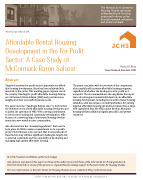Affordable Rental Housing Development in the For-Profit Sector: A Case Study of McCormack Baron Salazar
Despite the private for-profit sector's importance in affordable housing development, there has been relatively little research on the sector. This working paper explores one of the country's leading for-profit affordable housing developers, McCormack Baron Salazar (MBS) and provides some insights into their successful business model.
The paper uses the "Quadruple Bottom Line," to both review the literature on for-profit affordable housing developers and to assess the operation of MBS. With a strong commitment to low-income housing and community revitalization, MBS focuses on converting large, deteriorated housing developments into new mixed-income communities.
Also discussed are the "essential ingredients," that need to be in place for MBS to make a commitment to do a specific project. Nevertheless, even a project that incorporates all of these factors may still face significant challenges, largely due to external constraints and the complexity of developing and managing high quality affordable housing.
The paper concludes with an overview of the components of successful public-private affordable housing programs, regardless of whether the developer is a for-profit or a nonprofit. The recommendations also emphasize the importance of a strong and committed federal role in affordable housing development, including the need for deeper housing subsidies, with less reliance on multiple funders for putting together affordable housing development deals. Even a large, well-capitalized firm like MBS cannot develop affordable housing without additional significant public and private resources.

